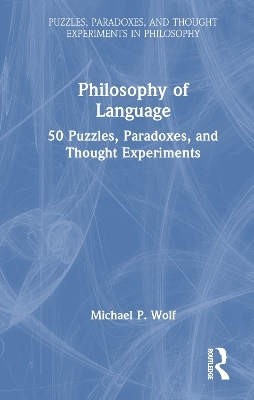
Philosophy of Language
50 Puzzles, Paradoxes, and Thought Experiments
Seiten
2023
Routledge (Verlag)
978-1-032-02386-1 (ISBN)
Routledge (Verlag)
978-1-032-02386-1 (ISBN)
This book offers fifty short chapter entries on topics in the philosophy of language. Each addresses a paradox, a longstanding puzzle, or a major theme that has emerged in the field, tracing overlap with issues in philosophy of mind, cognitive science, ethics, political philosophy, and literature.
This book offers readers a collection of 50 short chapter entries on topics in the philosophy of language. Each entry addresses a paradox, a longstanding puzzle, or a major theme that has emerged in the field from the last 150 years, tracing overlap with issues in philosophy of mind, cognitive science, ethics, political philosophy, and literature. Each of the 50 entries is written as a piece that can stand on its own, though useful connections to other entries are mentioned throughout the text. Readers can open the book and start with almost any of the entries, following themes of greatest interest to them. Each entry includes recommendations for further reading on the topic.
Philosophy of Language: 50 Puzzles, Paradoxes, and Thought Experiments is useful as a standalone textbook, or can be supplemented by additional readings that instructors choose. The accessible style makes it suitable for introductory level through intermediate undergraduate courses, as well as for independent learners, or even as a reference for more advanced students and researchers.
Key Features:
Uses a problem-centered approach to philosophy of language (rather than author- or theory-centered) making the text more inviting to first-time students of the subject.
Offers stand-alone chapters, allowing students to quickly understand an issue and giving instructors flexibility in assigning readings to match the themes of the course.
Provides up-to-date recommended readings at the end of each chapter, or about 500 sources in total, amounting to an extensive review of the literature on each topic.
This book offers readers a collection of 50 short chapter entries on topics in the philosophy of language. Each entry addresses a paradox, a longstanding puzzle, or a major theme that has emerged in the field from the last 150 years, tracing overlap with issues in philosophy of mind, cognitive science, ethics, political philosophy, and literature. Each of the 50 entries is written as a piece that can stand on its own, though useful connections to other entries are mentioned throughout the text. Readers can open the book and start with almost any of the entries, following themes of greatest interest to them. Each entry includes recommendations for further reading on the topic.
Philosophy of Language: 50 Puzzles, Paradoxes, and Thought Experiments is useful as a standalone textbook, or can be supplemented by additional readings that instructors choose. The accessible style makes it suitable for introductory level through intermediate undergraduate courses, as well as for independent learners, or even as a reference for more advanced students and researchers.
Key Features:
Uses a problem-centered approach to philosophy of language (rather than author- or theory-centered) making the text more inviting to first-time students of the subject.
Offers stand-alone chapters, allowing students to quickly understand an issue and giving instructors flexibility in assigning readings to match the themes of the course.
Provides up-to-date recommended readings at the end of each chapter, or about 500 sources in total, amounting to an extensive review of the literature on each topic.
Michael P. Wolf is Professor of Philosophy at Washington and Jefferson College. He writes on topics in philosophy of language, epistemology, and metaethics. His published works include The Normative and the Natural (2016) with Jeremy Koons, and numerous articles in journals such as Philosophical Studies, Pacific Philosophical Quarterly, and Philosophical Investigations.
Part I: Big picture questions Part II: Early Analytic Philosophy and Pragmatism Part III: Wittgenstein on Rule-Following and Private Language Part IV: Semantic Paradoxes Part V: Context-Sensitivity Part VI: Speech Acts and Pragmatics Part VII: Lingering Issues About Meaning Part VIII: Naturalism and Externalism
| Erscheinungsdatum | 06.08.2022 |
|---|---|
| Reihe/Serie | Puzzles, Paradoxes, and Thought Experiments in Philosophy |
| Verlagsort | London |
| Sprache | englisch |
| Maße | 129 x 198 mm |
| Gewicht | 285 g |
| Themenwelt | Geisteswissenschaften ► Geschichte |
| Geisteswissenschaften ► Philosophie ► Philosophie der Neuzeit | |
| Geisteswissenschaften ► Psychologie ► Allgemeine Psychologie | |
| Geisteswissenschaften ► Psychologie ► Verhaltenstherapie | |
| ISBN-10 | 1-032-02386-4 / 1032023864 |
| ISBN-13 | 978-1-032-02386-1 / 9781032023861 |
| Zustand | Neuware |
| Informationen gemäß Produktsicherheitsverordnung (GPSR) | |
| Haben Sie eine Frage zum Produkt? |
Mehr entdecken
aus dem Bereich
aus dem Bereich


